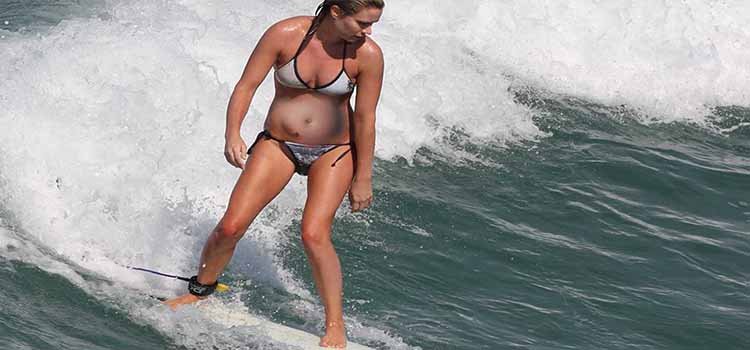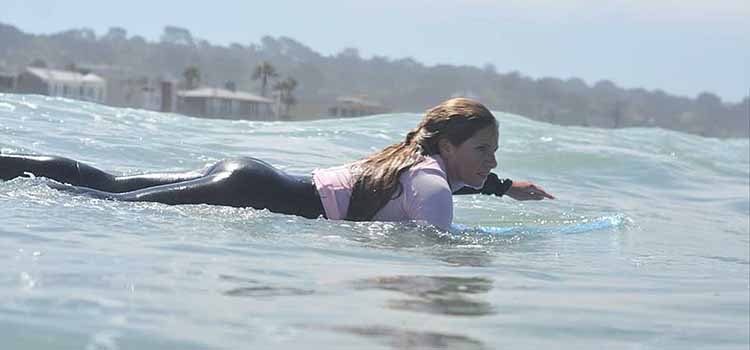As an Amazon Associate I earn from qualifying purchases.
This post contains affiliate links.
Can you surf while pregnant? This question often arises among expectant mothers who have a passion for riding the waves. Pregnancy is a time of joy, anticipation, and numerous lifestyle adjustments. For avid surfers, the prospect of hanging up their board for nine months might seem daunting. However, the decision to continue surfing during pregnancy is not a straightforward one and requires careful consideration of both the potential risks and benefits involved.

In this article, we’ll delve into the nuanced discussion surrounding surfing during pregnancy. We’ll explore the potential risks and benefits, address safety measures and precautions, and consider expert opinions and experiences to help expecting mothers make informed decisions about surf while pregnant.
Potential risks associated with surf while pregnant
Surf while pregnant poses potential risks due to the dynamic nature of the sport. Factors like balance challenges, unexpected falls, and the impact of waves on the abdomen may endanger both the mother and the fetus. Additionally, exposure to seawater bacteria and the risk of collision with surfboards or other surfers could lead to injury. Furthermore, the physical exertion and stress from paddling and navigating waves might strain an expectant mother’s body.
Potential benefits of surf while pregnant
Staying active during pregnancy offers numerous benefits. Regular exercise can enhance overall well-being, improve mood, and promote better sleep. It helps to fulfill muscle strength, flexibility, and cardiovascular health. Engaging in physical activity while pregnant can assist in managing weight gain, reducing discomfort, and preparing the body for labor. Moreover, it may lower the risk of gestational diabetes and high blood pressure, contributing to a healthier pregnancy.
Expert opinions on the balance between benefits and risks
Experts often emphasize a balance between the benefits and risks of physical activities, like surfing, during pregnancy. While exercise promotes health, caution is crucial. Obstetricians commonly recommend low-impact activities and avoiding high-risk sports that may pose dangers to the mother or fetus. The consensus is to prioritize safety, considering individual health, fitness level, and the specific demands of the activity. It’s advised to consult healthcare professionals for tailored advice, ensuring a balance that maximizes the benefits of staying active while minimizing potential risks to surf while pregnant.
Factors to consider before deciding to surf while pregnant
Several factors warrant consideration before deciding to surf while pregnant:
- Medical advice: Consultation with healthcare providers to assess individual health, pregnancy progress, and potential risks associated with surfing.
- Physical changes: Consider bodily changes, like balance, weight distribution, and stamina, affecting surfing abilities during pregnancy.
- Risk assessment: Evaluate potential dangers such as falls, impact from waves, and exposure to bacteria in seawater.
- Alternative activities: Explore safer exercises or modified surfing techniques that align with pregnancy needs.
- Personal comfort: Assess personal comfort levels, stress, and mental preparedness for engaging in a physically demanding sport during pregnancy.
- Safety precautions: Consider safety measures, like wearing appropriate protective gear and surfing in safe conditions, to minimize risks.
The story of two pregnant surfers I have known:
Jessica:

Jessica, a dedicated surfer, found herself expecting during the peak surfing season. Determined to stay connected to her passion, she modified her approach. With guidance from her obstetrician, she continued surfing but opted for smaller, gentler waves and wore extra padding for abdominal protection. Jessica’s cautious yet joyful experiences riding the waves during pregnancy became an inspiration for other expecting surfers in her community.
Sarah:

Sarah, an avid surfer, chose to pause her surfing routine during pregnancy due to safety concerns. While she missed the thrill of riding waves, she found solace in other water-based activities that were deemed safer for her and the baby. Sarah maintained her connection to the ocean by swimming and paddleboarding, ensuring a balance between her love for surfing and the need for a safer alternative during this special time.
Alternatives and Modifications for Surfing Enthusiasts
Modified techniques of surf while pregnant:
Modified surfing techniques can help expectant mothers engage in the activity more safely during pregnancy:
- Shortened surfing sessions: Reduce the duration of surfing sessions to prevent overexertion and fatigue.
- Choosing smaller waves: Opt for smaller and gentler waves to lower the risk of falls or sudden jolts that could impact the abdomen.
- Using a larger board: Switching to a longer or wider surfboard can enhance stability and balance, reducing the chances of losing equilibrium.
- Padding for protection: Employing extra padding around the abdomen area can provide added protection against accidental impacts or falls.
- Avoiding crowded waters: Surfing in less crowded areas minimizes the risk of collisions with other surfers or boards.
- Regular breaks: Take frequent breaks to rest and hydrate, ensuring the body doesn’t become overly fatigued.
Safe alternatives to surf while pregnant:
- Swimming: Gentle swimming is a low-impact aerobic exercise that offers a full-body workout while reducing stress on joints.
- Paddleboarding: Stand-up paddleboarding in calm waters provides a similar connection to the ocean without the dynamic movements and potential risks associated with surfing.
- Walking: Walking is a simple yet effective way to stay active during pregnancy. It’s low-impact and can be done at one’s own pace, aiding in cardiovascular health.
- Water aerobics: Joining water aerobics classes tailored for pregnant women offers a safe way to exercise in a supportive environment.
- Yoga: Prenatal yoga classes focus on stretching, breathing, and relaxation techniques that benefit both the body and mind during pregnancy.
These modifications aim to prioritize safety while allowing expectant mothers to continue enjoying the sport of surfing during pregnancy with reduced risk. Always consult a healthcare professional for personalized advice before engaging in any physical activity during pregnancy.
Tips and recommendations for pregnant women interested in surfing:
For pregnant women interested in surfing, here are some tips and recommendations:
- Consult a healthcare professional: Prioritize a thorough discussion with your obstetrician or midwife to assess the risks and benefits of surfing during pregnancy.
- Modify your approach: Consider using a larger, more stable board, opting for smaller waves, and shortening your surfing sessions to reduce risks.
- Prioritize safety gear: Wear appropriate protective gear, such as a well-fitted leash and extra padding around the abdomen, to minimize potential injuries.
- Attention to your body: Concentrate on your body’s signals and limitations. If you feel tired or uncomfortable, take stoppage and hydrate regularly.Avoid crowded waters: Surf in less crowded areas to reduce the risk of collisions and ensure a safer environment.
- Know when to stop: Be willing to pause or stop surfing if you feel any discomfort, experience unusual symptoms, or receive advice from your healthcare provider to do so.
- Consider alternatives: Explore safer water-based activities that offer similar experiences without the potential risks associated with surfing during pregnancy.
Remember, every pregnancy is unique. Always prioritize safety and make informed decisions that align with your health and the well-being of your unborn child.
Final thoughts and considerations for pregnant women who love surfing:
For pregnant women who cherish surfing, it’s crucial to prioritize both maternal and fetal safety. While the allure of catching waves persists, considering alternative water-based activities or modifying surfing techniques may provide a safer experience during pregnancy. Consulting healthcare professionals for personalized guidance is paramount. Listen closely to your body’s cues and be open to adapting or discontinuing surfing if necessary.
Remember, staying connected to the water through safer activities can maintain your love for the ocean while safeguarding the precious journey of pregnancy. Ultimately, making informed decisions that prioritize well-being ensures a fulfilling and joyous experience during this special time.
As an Amazon Associate I earn from qualifying purchases.
Leave a Reply